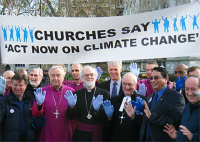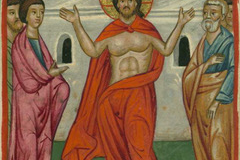Archbishop Nichols: live simply, so that others can simply live

Church leaders before this morning's service
It is vital that the needs of the world's poorest and most disadvantaged are at the centre of the debate about climate change, the Most Reverend Vincent Nichols, Archbishop of Westminster, has told Christians at 'Time to Pray', an ecumenical service about the environment and climate change held in London today.
The Most Reverend Rowan Williams, Archbishop of Canterbury, David Gamble, President of the Methodist Conference and Steve Clifford, Director of the Evangelical Alliance were amongst other Christian leaders speaking at the service. The service took place at Westminster Central Hall, prior to 'The Wave', a march in central London designed to highlight climate change issues prior to the Copenhagen inter-governmental climate summit.
Archbishop Nicholas urged people to consider their own lifestyles when thinking about climate change, and said that people should live more simple lives, not dominated by the demands of the consumer society.
"Pope Benedict XVI in his statement to the UN Climate Change Initiative in September this year" said Archbishop Nichols, "made clear that since the natural environment is given by God to everyone, so our use of it 'entails a personal responsibility towards humanity as a whole, particularly towards the poor and towards future generations'."
"This is why we are right to repeat again and again the straightforward appeal: 'Live simply!'; 'Live simply so that others may simply live and so that our planet may be cared for and not exploited. Of course we sense within us never-ending demands, often provoked by the culture of our consumer society. But we must look hard at the way we live our lives and consider again those whose future is threatened by the effects of our own lifestyles. Only when we are clearly prepared to change the way we live will politicians be able to achieve the change we say we want to see."
Archbishop Nichols also said that the development of technology, one of the gifts of God's creation, would play an important role in resolving environmental problems.
"Technological advance is a crucial part of the way we will find solutions to the problems caused by climate change. Technology, of course, is not morally neutral. Rather its proper use is guided always by its effect on the common good. So today let us say, let the genius of our finest minds serve the needs of all, and the needs of our environment."
Full text follows
This morning is a marvellous expression of solidarity and compassion and they are robust Christian virtues!
Today we are concerned for all those whose lives are directly affected by climate change, the world's poorest and the most disadvantaged. This is an important perspective which we must not lose in the midst of all the other concerns expressed in recent weeks.
We know that issues of world poverty and development cannot be separated from concerns for the environment. They are intimately connected. Indeed, in a memorable phrase Pope Benedict XVI said: "The book of nature is one and indivisible."
This is all about how you and I live each day. That is why our religious faith is so important in tackling the problems that we face because our faith is directly concerned with how we live each day, how we put truth and belief into practice. In that daily living you and I know that there is much to do before we achieve sound and sustainable relationships between the peoples of this earth and with the environment of the created world.
Pope Benedict XVI in his statement to the UN Climate Change Initiative in September this year, made clear that since the natural environment is given by God to everyone, so our use of it "entails a personal responsibility towards humanity as a whole, particularly towards the poor and towards future generations." This is why we are right to repeat again and again the straightforward appeal: 'Live simply!'; 'Live simply so that others may simply live and so that our planet may be cared for and not exploited!'
Of course we sense within us never-ending demands, often provoked by the culture of our consumer society. But we must look hard at the way we live our lives and consider again those whose future is threatened by the effects of our own lifestyles. Only when we are clearly prepared to change the way we live will politicians be able to achieve the change we say we want to see.
There is a lovely quotation from His Holiness, The Ecumenical Patriarch, Bartholomew. He says:
"The age of information permits no excuse for ignorance, inaction or indifference with regard to containing and reversing climate change. There is nothing less than a moral imperative for all people despite and indeed beyond political or racial differences. Refusing to acknowledge the demands of our planet is a sin against creation. Resisting them is tantamount to blasphemy against God."
They are important words from the Ecumenical Patriarch.
Creation reflects God's goodness. To love God is, among other things, to give thanks and praise for the gifts of creation and to recognise that they are destined for all people. Technology, for example is one of those gifts, part of the call of God 'to cultivate and take care of the land' (Gen 2.15). So technological advance is a crucial part of the way we will find solutions to the problems caused by climate change.
Technology, of course, is not morally neutral. Rather its proper use is guided always by its effect on the common good. So today let us say, let the genius of our finest minds serve the needs of all, and the needs of our environment.
Our voices today are not filled with anxiety or gloom, but with hope. This is because we know the source of true, enduring hope. Our most radical hope lies in the truth of the promised final completion, the final resurrection of all created beings, transformed into the reality of that wonderful vision of 'a new heaven and a new earth.'(Rev 8.19-23)
This is the hope that inspires us to insist that our world is not our own, not at our disposal, not for us to do with just what we like.
Indeed, at the centre of our world stands the human person, every single one made in the image and likeness of God and deserving, for that reason alone, respect, freedom and cooperation.
It is hope that inspires us; faith that sustains us. Our union with Christ in prayer is our source of energy, of a new life for our effort as his disciples.


















